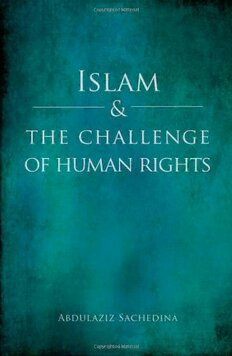
Islam and the Challenge of Human Rights PDF
265 Pages·2009·1.261 MB·English
Most books are stored in the elastic cloud where traffic is expensive. For this reason, we have a limit on daily download.
Preview Islam and the Challenge of Human Rights
Description:
In 1948, the General Assembly of the United Nations adopted and proclaimed the International Declaration of Human Rights, a document designed to hold both individuals and nations accountable for their treatment of fellow human beings-regardless of religious or cultural affiliations. Since then, debates surrounding the reach and scope of the Declaration have been lively and wide-ranging, with the compatibility of Islam and human rights emerging as a particularly thorny issue of international concern. The question has been addressed by Muslim rulers, conservatives, and extremists, as well as Western analysts and policymakers, all of whom have commonly agreed that Islamic theology and human rights cannot coexist.In this book, Abdulaziz Sachedina rejects this informal consensus, arguing instead for the essential compatibility of Islam and human rights. His work is grounded in a rigorous comparative approach; he not only measures Islam against the yardstick of human rights, but also measures human rights against the theological principles of Islam. He offers a balanced and incisive critique of Western experts who have ignored or underplayed the importance of religion to the development of human rights, arguing that any theory of universal rights necessarily emerges out of particular cultural contexts. At the same time, he re-examines the juridical and theological traditions that form the basis of conservative Muslim objections to human rights, arguing that Islam, like any culture, is open to development and change. Finally, and most importantly, Sachedina articulates a fresh position that argues for a correspondence between Islam and secular notions of human rights. Grounding his work in Islamic history and thought, he reminds us that while both traditions are rigorous and rich with meaning, neither can lay claim to a comprehensive vision of human rights. He never loses sight of the crucial practical consequences of his theory: what's needed is not a comprehensive system of doctrine, but a set of moral principles that are capable-whether sacred or secular--of protecting human beings from abuse and mistreatment
See more
The list of books you might like
Most books are stored in the elastic cloud where traffic is expensive. For this reason, we have a limit on daily download.
